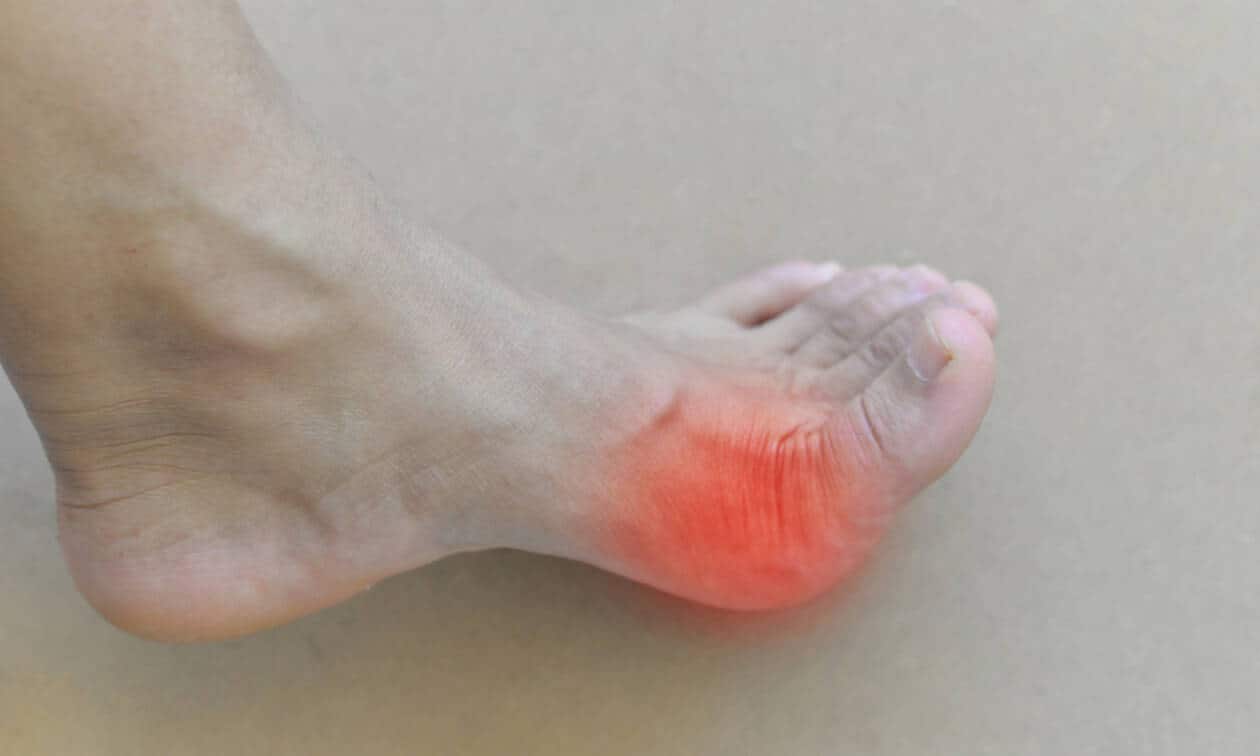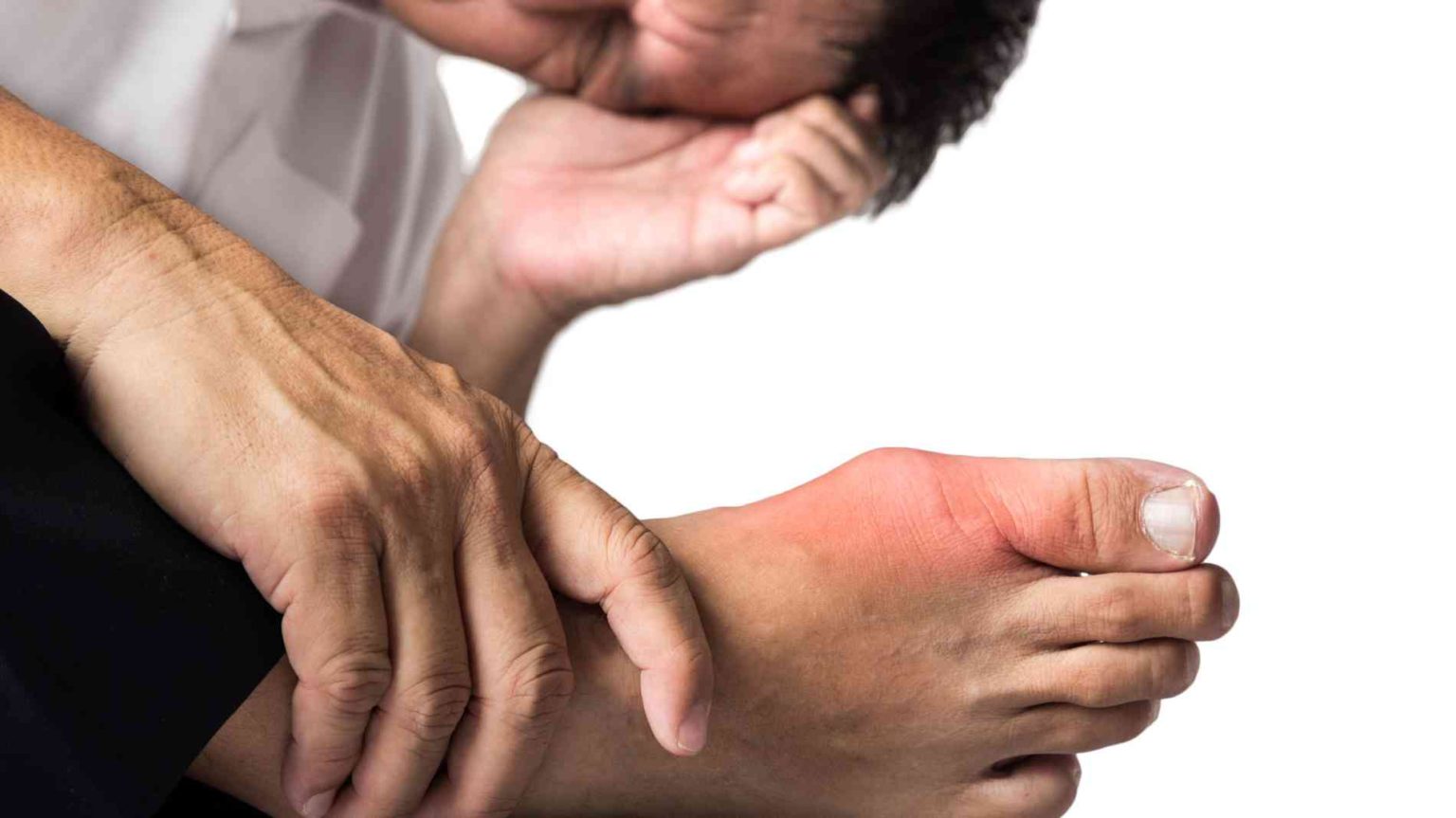If you’re wondering what is gout and how you get it, then you’ll find the answer here. Not only will you get to know what gout is in a simple to understand the language but you’ll also discover gout causes, symptoms, treatment, and risk factors.
OVERVIEW OF GOUT
Gout is one of many forms of arthritis and responsible for around 5% of all cases of arthritis. It is caused by needle-like microscopic crystals that form in the joints and connective tissue. In most cases, the symptoms appear in the joint of the big toe but gout can appear in the feet, ankles, knees, elbows, wrists, hands, or fingers, etc.
It is also one of the most painful forms of arthritis and can be extremely debilitating. The pain can be so extreme that the slightest brush of a light bed sheet on the affected area can cause excruciating pain. And this, coupled with the swelling and inflammation, can make it very difficult to get around, especially when it is located in the foot.
Acute gout attacks can come on very suddenly with little or no warning and very often happen during the night.
Untreated gout attacks can last from a few days to several weeks depending on their severity. A further complication is that once having had one attack a sufferer is then more likely to have more. These gout attacks become more regular and more severe and can lead to permanent joint damage and kidney problems.
However, there are medications that can help to treat and manage the condition. And there are also lifestyle and dietary changes that can help to prevent recurring gout episodes.
GOUT SYMPTOMS

Gout symptoms are actually caused by your body’s inflammatory reaction to the crystals in your joints. This is a natural reaction to get rid of the ‘invaders’ and repair the damage. It does this by flooding the affected site with white blood cells and other chemicals.
It is this inflammatory process that actually causes the symptoms of gout; swelling, stiffness, heat, redness, inflammation, and pain. Sufferers may also have a slight fever in some cases.
GOUT CAUSES
The condition which raises the likelihood of crystal formation is higher-than-normal uric acid levels in the blood — a condition called hyperuricemia.
Uric acid is produced when ‘purines’ breakdown during the body’s metabolizing process. Purines are chemical compounds found in our bodies’ cells and in those of plants and animals. They are vital to our survival as they help to convert food into energy, genes into protein, and protect our cells from cancer-causing agents.
WHAT CAUSES HYPERURICEMIA?

Under normal circumstances, your kidneys process and excrete excess uric acid via urine with a little via stools. This results in normal uric acid levels in the blood.
However, if your body is manufacturing too much uric acid for your kidneys to deal with, or, your kidneys are not working to their full potential, then insufficient uric acid is being excreted resulting in high uric acid levels in your blood…
Remember purines? Well, as they also exist in our food, consuming foods that are high in purines adds to the overall uric acid output. This can happen to such an extent that healthy kidneys just cannot cope, meaning that excess acid is retained in the blood.
And any problem with your kidneys that interferes with their ability to carry out their function effectively means that even with normal levels of uric acid production, not enough acid is being flushed out of your body.
In other words, anything that interferes with the kidney’s ability to eliminate uric acid and/or anything that helps to over-produce uric acid in the body can lead to hyperuricemia and so gout.
WHO IS AT RISK OF GOUT?
- People with kidney disease or poor kidney functionality.
- Those who consume large amounts of high purine foods.
- Folks who are overweight. Studies have shown that folks who are overweight are more likely to have higher uric acid levels. Being overweight is one of the most common causes of hyperuricemia.
- Those who drink regular, large amounts of alcohol, especially beer.
- Some medicines can cause hyperuricemia by interfering with the natural process of elimination. These are medications such as diuretics and chemotherapy drugs.
- Patients who have some underlying medical conditions. These include; hypertension (high blood pressure), diabetes, arteriosclerosis (narrowing of the arteries), and hyperlipidemia (high fat and cholesterol in the blood).
- Studies have shown that there is a link between gout and a family history of gout. Around 25% of gout sufferers have a family history of gout or arthritis.
GOUT TREATMENT
The usual treatment is a medication prescribed by your physician. These are things like NSAIDs (non-steroidal anti-inflammatory drugs), Colchicines and Corticosteroids for pain and inflammation, and uric-acid-decreasing drugs such as Allopurinol to help maintain low uric acid levels.
Whilst they can be very effective, like most drugs, they do have some negative side effects that can adversely affect some people. And the acid-reducing drugs need to be taken long-term as they are only effective whilst being taken.
NATURAL GOUT REMEDIES
There are also natural home remedies for gout that sufferers seem to be using more and more today…
One of the most effective is changing to a low-purine diet in order to reduce the production of uric acid. This means avoiding or reducing the consumption of foods like organ meats, game, some fish, and shellfish.
Then there are natural remedies that utilize things like herbs, fruits, supplements, etc., not only to help reduce uric acid but also to reduce inflammation and relieve pain. For example, alfalfa can help neutralize uric acid, cherries can reduce inflammation and also uric acid levels, and vitamin C is also able to lower uric acid levels.
SUMMARY
A gout is a form of arthritis caused by high uric acid in the blood, a condition called hyperuricemia. The symptoms are redness, swelling, stiffness, heat, inflammation, and great pain, sometimes with a slight fever.
Risk factors are: being overweight, consuming too much alcohol, having a high purine diet, kidney disease / poor function, some medications, some medical conditions, and a family history of gout.
To help prevent gout you need to lower your uric acid levels. This can be done through drugs — although they can have side effects — or natural home remedies. (But be guided by your physician/doctor and never take any medications or embark on natural remedies without consulting with them first.)
Gout prevention is paramount because frequently recurring gout can lead to kidney problems such as kidney stones and permanently damaged joints…

